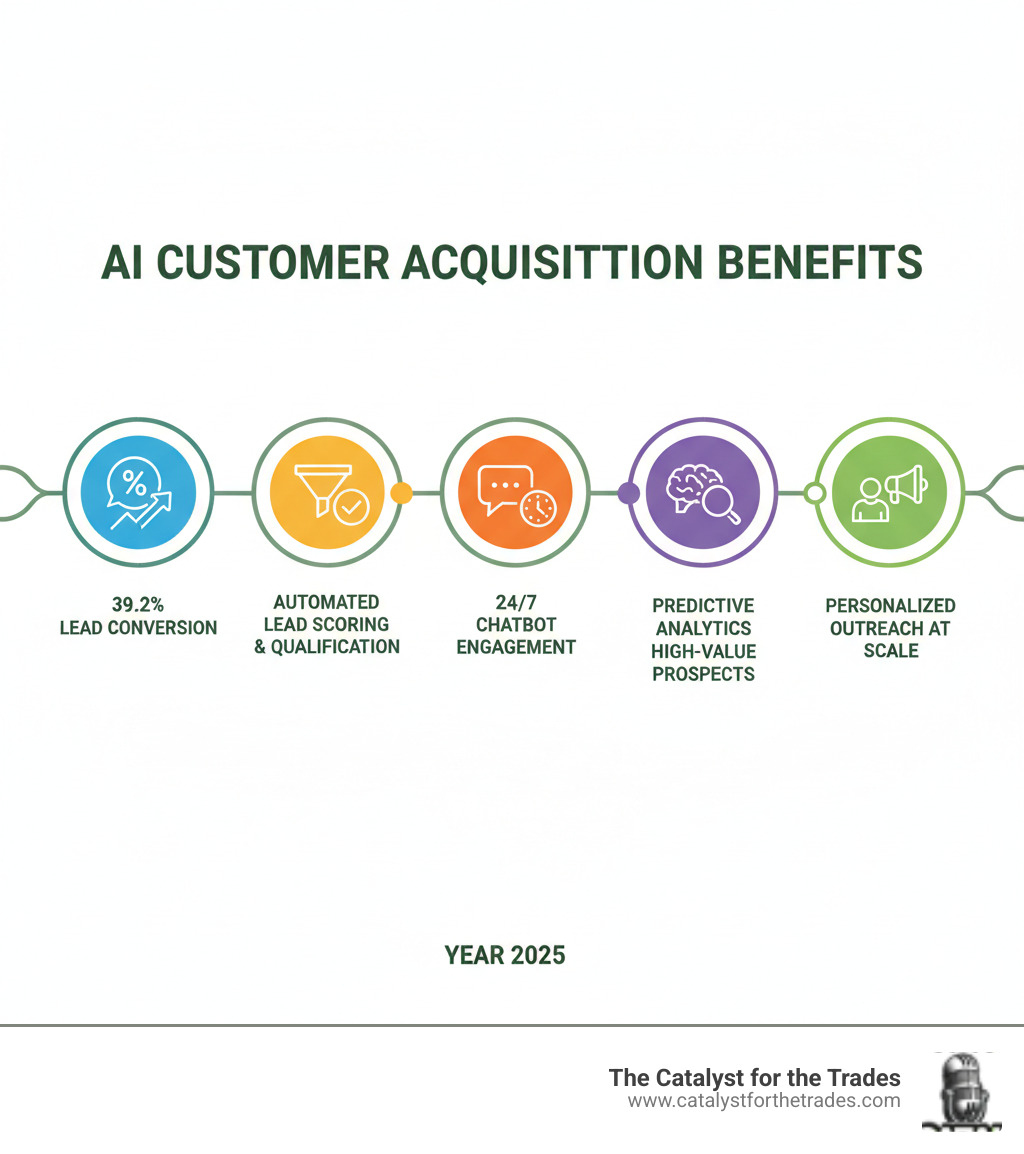Discover business acumen: core components, traits of leaders, development steps & metrics to boost decision-making and scale success.

The AI Marketing Playbook: Automate, Personalize, and Grow Your Audience
Introduction: The End of Guesswork in Marketing
AI customer acquisition is revolutionizing how home service businesses operate, using artificial intelligence to automate marketing, predict customer behavior, and deliver personalized experiences at scale.
Key AI Customer Acquisition Benefits:
- 39.2% lead conversion for early adopters using AI automation
- 50% increase in leads through AI-powered targeting
- 76% conversion rate achieved with AI voice receptionists
- 70% ROI increase by turning missed calls into closed deals
- 24/7 customer engagement without hiring additional staff
Gone are the days of casting wide, expensive nets and hoping for the best. Traditional marketing was time-consuming and unpredictable. Today, successful home service businesses are ditching the guesswork. They use AI to identify high-intent customers, automate follow-ups, and personalize every interaction without burning out their teams.
The shift is dramatic. For example, Neighborly achieved a 372% increase in revenue-converting leads by automating conversations. The Xcite Group generated over $745,000 in recurring revenue by using AI to capture after-hours leads.
This isn't about replacing human connection—it's about amplifying it. AI handles repetitive tasks so your team can focus on what matters: building relationships and solving problems for customers who are ready to buy.

The New Sales Engine: How AI is Redefining Growth
Picture this: Instead of your team cold-calling leads that may never convert, AI customer acquisition tools identify prospects who are actively searching for your services right now. This isn't a fantasy; it's a fundamental shift in how home service businesses win customers. The old 'spray and pray' approach is obsolete.
The new sales engine runs on predictive intelligence. AI analyzes thousands of data points to forecast which leads will convert, spotting buying signals before humans can. This change is creating two types of businesses: those that accept AI-powered customer acquisition and grow, and those that stick to old methods and fall behind.
Successful companies are already using AI to surface high-intent accounts—prospects actively looking for solutions. As we explored in How AI and Digital Tools Are Changing the Way Home Services Sell, this empowers sales teams to focus on building relationships. The results are clear: companies using predictive revenue models can forecast their pipeline with remarkable accuracy, enabling smarter business decisions.
The Evolution of AI in Marketing
AI in marketing has evolved rapidly. Early models were simple rule-based systems, like basic email autoresponders. The breakthrough came with machine learning and Natural Language Processing (NLP), allowing AI to understand customer intent and power smarter chatbots and recommendation engines.
Now, we're in the age of Generative AI, which not only analyzes data but also creates personalized content and handles complex conversations. 2024 strategies focus on making these powerful tools accessible and affordable for businesses of all sizes, including HVAC, plumbing, and electrical services.
From Repetitive Tasks to Strategic Decisions
AI customer acquisition transforms your team from hunters into trusted advisors. It automates low-leverage tasks like data entry, scheduling, and lead qualification, which are necessary but don't require human creativity.
With AI handling the busywork, your team can focus on relationships. They can spend their time understanding customer needs, asking better questions, and providing expert insights. When your technicians and sales reps become advisors, they can tackle complex problem-solving that AI can't, building the trust that leads to long-term loyalty.
This approach works. Companies using AI for lead scoring see an increased sales productivity of about 20%. This gain comes from working smarter, not longer. Your team stops chasing every lead and starts having meaningful conversations with people ready to buy—the key difference between being busy and being profitable.
Core Strategies for AI Customer Acquisition
Moving from theory to practice, AI customer acquisition is a toolkit that includes predictive analytics, hyper-personalization, conversational AI, and more. As we explored in How AI Voice and Chat Are Changing the Home Service Game, companies using these strategies are achieving a 39.2% lead conversion rate—a true game changer. AI handles the heavy lifting, letting your team focus on building relationships.
Hyper-Personalization at Scale: The New Standard in AI Customer Acquisition

Modern personalization goes far beyond using a first name in an email. AI customer acquisition creates experiences so custom that customers feel you're reading their minds. Every touchpoint is crafted based on their behavior, preferences, and context.
The results are compelling. According to McKinsey research on personalization, businesses using these strategies see a 10-15% increase in revenue. This is because 71% of consumers now expect personalized interactions. For example, personalized emails alone can generate a 760% increase in revenue compared to generic campaigns. For a home service business, this means showing a homeowner the exact maintenance package they need based on their home's age and energy usage—a genuinely helpful approach.
Predictive Analytics for Smarter AI Customer Acquisition
Predictive analytics is like a crystal ball for your business, using AI to analyze historical data and forecast what's next. AI-driven lead scoring is especially powerful, as it ranks prospects by their likelihood to convert. By 2024, 70% of marketing leaders expect this to be a critical part of their strategy.
Companies using AI for lead scoring report a 20% increase in sales productivity because their teams focus on hot leads. Furthermore, AI sales tools can increase leads by over 50% by targeting high-value prospects at the right moment. As detailed in Open up Free Money with AI: How Home Service Contractors Can Finally Fix Lead Management, predictive analytics turns your pipeline from guesswork into a predictable revenue engine.
24/7 Engagement with AI Chatbots and Voice Assistants
What if your business never closed? AI chatbots and voice assistants make that a reality. They provide instant responses, qualify leads, and guide customers 24/7. This is crucial in home services, where emergencies happen outside business hours. By 2024, AI chatbots are expected to handle 85% of all customer service interactions.
The results are impressive. Live 360 Marketing cut response times from 48 hours to 30 seconds and saw a 70% ROI increase by turning missed calls into deals. Elite Web Professionals achieved a 76% conversion rate using an AI Voice Receptionist. Neighborly automated conversations across all channels and saw a 372% increase in revenue-converting leads. The AI does the initial work, so your human agents can focus on closing deals with well-informed, high-intent prospects, a concept we explored in How AI is Changing Call Handling: Brad Scruggs on the Future of Home Service Communication.
A Practical Guide to Implementing AI in Your Trades Business
Ready to implement AI customer acquisition? The key is a strategic, step-by-step approach, as we explore in How to Stay Competitive as AI and Consumer Behavior Reshape Home Services. You don't need a complete overhaul overnight.
- Start small. Pick one problem, like missed calls or cold leads, and apply an AI tool. See the results, then expand.
- Prioritize data quality. AI is only as smart as the data you feed it. Clean and organize your customer information before you begin.
- Integrate your systems. Ensure your AI tools connect with your CRM and other software for a complete customer view.
- Keep the human touch. Use AI for repetitive tasks to free up your team for relationship-building and complex problem-solving.
- Follow ethical frameworks. Respect customer privacy and comply with regulations like GDPR and CCPA. Transparency builds trust.
Key AI Tool Categories for Your Business
- AI-improved CRMs (e.g., Salesforce Einstein, HubSpot AI) automatically score leads, predict sales, and suggest next steps.
- Conversational AI platforms (e.g., Drift) add 24/7 chatbots to your website to qualify leads and book appointments.
- Predictive analytics software analyzes data to forecast customer behavior, helping you identify opportunities and risks.
- AI content creation assistants (e.g., Jasper.ai) help you generate blog posts, social media updates, and emails that resonate with your audience.
- Digital ad optimization tools (e.g., Google Ads, Facebook Ads) use machine learning to automate bidding and targeting for better ad performance.
Overcoming the Challenges of AI Adoption
Implementing AI has its problems, but they are manageable.
- Data privacy concerns: Handle data responsibly. Be transparent about data collection and comply with privacy laws to build customer trust.
- Algorithm bias: Regularly audit your AI's performance to ensure it's treating all customer segments fairly. Work with vendors who prioritize mitigating bias.
- Implementation costs: Start with a single, high-impact tool and measure its ROI. Most businesses find that AI pays for itself through increased efficiency and conversions.
- Change management: Involve your team in the process. Frame AI as a tool that makes their jobs more strategic and interesting, not one that replaces them.
- Maintaining human connection: Use AI for routine interactions but ensure customers can easily reach a person for complex or emotional issues. As we discuss in How Decision Intelligence and AI Are Helping Contractors Make Smarter, Faster Choices, the best results come from combining AI with human intelligence.
The Future of Marketing: What's Next in AI-Powered Growth?

The future of AI customer acquisition is already unfolding, changing how home service businesses connect with customers. We're moving toward a world where an AI assistant can predict a customer's maintenance needs, send a personalized offer, and schedule the appointment automatically.
Product-Led Growth (PLG) is getting an AI upgrade, with service apps and portals guiding users through personalized experiences. Imagine an AI that offers tips or triggers a check-in call when a customer seems stuck in your scheduling system.
The biggest shift is unified GTM innovation, which breaks down the walls between sales, marketing, and customer success. Everyone works from the same AI-powered playbook. We're also seeing the rise of emotional AI, which can read customer sentiment and route a frustrated caller to the right person for empathetic support.
The Shift to AI-Driven Search and Advertising
The way customers find you is changing rapidly.
- AI search overviews are becoming the new front door. When someone searches for a service, they get an AI-generated summary. Your SEO strategy must evolve beyond traditional ranking, as less than half of these AI sources come from top-10 results.
- Voice search optimization is now essential. Customers are asking devices like Alexa to find services, so your content must match conversational language.
- Automated ad campaign management is set to handle $120 billion in global ad spending by 2024. AI is already optimizing your Google and Facebook ads to target the right people at the right time.
- Synthetic media creation allows businesses to create professional video ads with AI avatars in minutes, enabling rapid testing of different messages.
Blurring the Lines: The Integrated Go-to-Market Team
Successful businesses of the future will have a single, unified team, not separate departments. Workflow alignment ensures leads move seamlessly from marketing to sales to service. Shared data and KPIs create a single source of truth, giving everyone a complete view of the customer journey.
This integration fosters cross-functional collaboration. Technician feedback can inform marketing content, and sales insights can help the success team be more proactive. As we explored in AI-Driven Success for Contractors: Lynn Wise's Blueprint for the Future, this seamless collaboration is what separates thriving businesses from the rest. Your future hiring will focus on adaptable people who can work alongside AI to amplify their human strengths.
Frequently Asked Questions about AI Customer Acquisition
Diving into AI customer acquisition can feel daunting. Here are answers to the most common questions from home service contractors.
How can a small home service business start with AI?
Start small and focus on a specific pain point. For most, that's missed calls and lost leads. Implement an AI-powered chat or voice tool to capture leads 24/7. We've seen businesses cut response times from 48 hours to 30 seconds with this one change.
Another great starting point is using an AI assistant in your CRM to score leads automatically. This tells your team which prospects to call first. Pick one problem, implement a solution, measure the ROI, and then expand.
Will AI replace my customer service and sales teams?
No. AI is here to make your team superhuman, not obsolete. It acts as the ultimate assistant, handling repetitive tasks like data entry, answering common questions, and basic lead qualification. This frees your team to focus on what they do best: building relationships, solving complex problems, and closing deals that require a human touch.
AI shifts your team from being 'hunters' to 'trusted advisors' who engage with warm, qualified prospects. They become more valuable, not less.
Is implementing AI for marketing expensive?
Not necessarily. Many AI features are already built into tools you use, like your CRM or marketing automation platform. For standalone tools, many offer free trials or affordable starter plans.
The real question is about return on investment. When AI increases lead conversion, personalizes interactions, and boosts productivity, it often pays for itself quickly. For instance, better lead scoring alone can increase sales productivity by 20%. Start small, measure the results, and let the ROI guide your next investment.
Conclusion: Automate, Personalize, and Win with AI
The AI customer acquisition revolution is here, and it's delivering real results for home service businesses: 39.2% lead conversion rates, 76% conversion rates with AI voice assistants, and 372% increases in revenue-converting leads. The era of guesswork marketing—with its expensive ads and missed opportunities—is over.
Successful businesses now use AI to identify high-intent customers, automate follow-ups, and personalize every interaction. This isn't just about better numbers; it's about changing how your team works. AI frees your people from repetitive tasks, allowing them to become trusted advisors who build relationships and solve complex problems.
The competitive advantage is clear. Early adopters are capturing more leads and converting them at higher rates, creating a gap that will only widen. At The Catalyst for the Trades, we see this technology amplifying the human element that makes home services special.
The businesses that thrive will combine AI's power with genuine customer care. They will automate the mundane to deliver experiences that are both efficient and human. As we explore in The AI Revolution in Home Services: How to Future-Proof Your Trades Business, the companies that accept AI today will lead their markets tomorrow. The revolution is here—it's time to adapt and win.

Discover how leading home‑service companies are leveraging AI, subscription models, and digital‑first strategies.
Learn why private equity, automation, and customer‑centric tech are reshaping the trades.
Episodes you may like


Lead your crew to victory! Master essential contractor leadership strategies for project success, safety, and team empowerment.

Harness real-time data with cortex pulse analytics. Get AI-driven insights, detect issues instantly, and make smarter business decisions.
.png)




